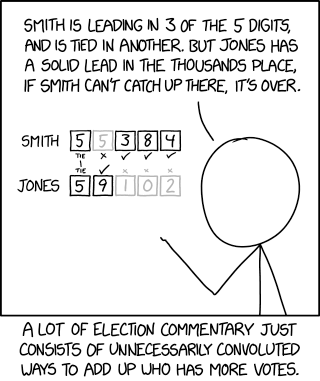Election Commentary

This really validates Jones's strategy of getting several thousand more votes than Smith. In retrospect, that was a smart move; those votes were crucial.

This really validates Jones's strategy of getting several thousand more votes than Smith. In retrospect, that was a smart move; those votes were crucial.
This comic is a joke about the way newscasters commentate elections, and how they make it far more complicated than it needs to be in an election in which the candidate with the most votes wins. It's not uncommon for these methods to be used to imply the election is neck-and-neck long past the point one candidate has an insurmountable lead.
Smith has 55384 votes, while Jones has 59102 votes. Instead of comparing the votes as one number, and admitting that Jones' four thousand vote lead is likely going to earn him the win, Cueball compares each digit to see which is larger. Smith's digits in the hundreds, tens, and ones are all higher than Jones', so ultimately he implies that Smith has a chance to win, if only he could pull ahead in the thousands digit and secure a dramatic upset. In reality all that matters is who has the higher total number of votes.
It should be noted that for U.S. Presidential elections, the candidate with more votes does not necessarily win. Each state (plus the District of Columbia) gets a certain number of votes, and the victor in those states usually (though not always) receives all of the state's votes. In that specific case, tracking individual victories (though in states, not in digits) is actually highly relevant to who wins. That said, the comic appears be depicting something on a much smaller scale, such as a municipal or district election, which is likely to use the more common most-votes-wins method of election.
The title text is a similarly satirical twist on a common news comment during elections. Candidates often employ different strategies during the election season, with varying degrees of success. For example, if a strategy collected many votes (or important votes, see above paragraph), then it could be said that the area it affected was "crucial". Here, the area affected by Jones' strategy (an entire place value) is said to have been crucial — an obvious claim, seeing as greater place values always result in greater amounts indicated.